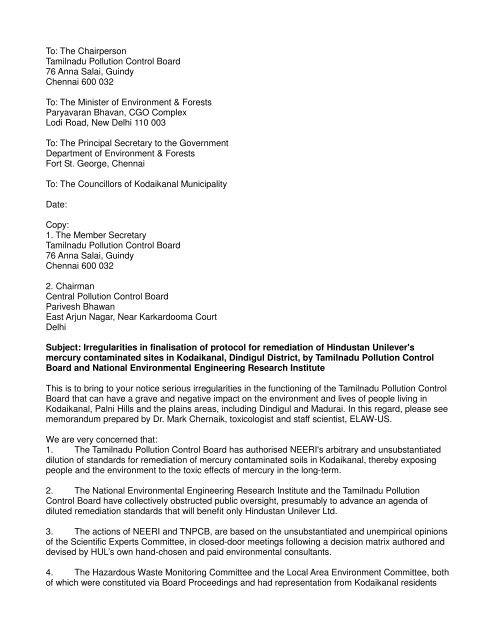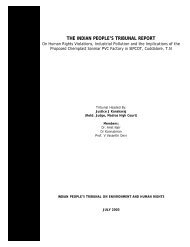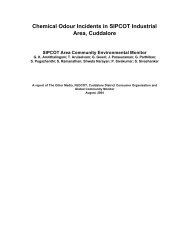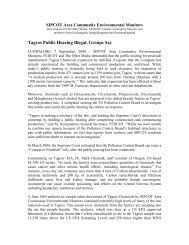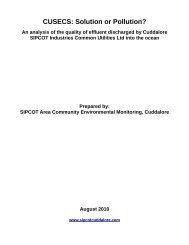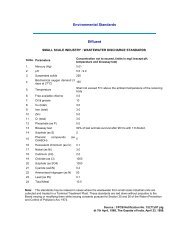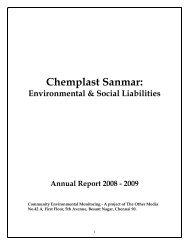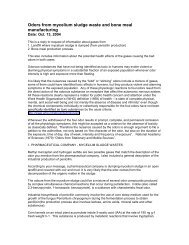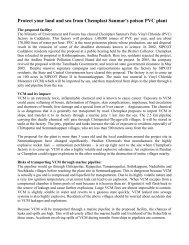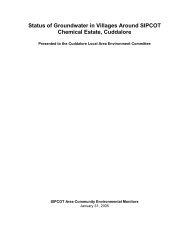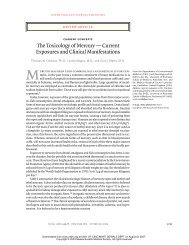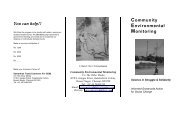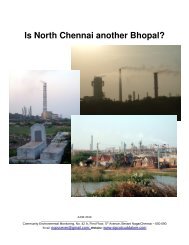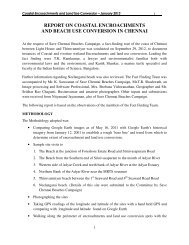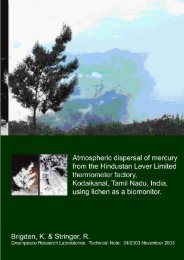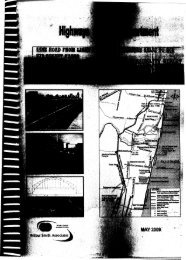To: The Chairperson Tamilnadu Pollution Control Board 76 Anna ...
To: The Chairperson Tamilnadu Pollution Control Board 76 Anna ...
To: The Chairperson Tamilnadu Pollution Control Board 76 Anna ...
Create successful ePaper yourself
Turn your PDF publications into a flip-book with our unique Google optimized e-Paper software.
<strong>To</strong>: <strong>The</strong> <strong>Chairperson</strong><br />
<strong>Tamilnadu</strong> <strong>Pollution</strong> <strong>Control</strong> <strong>Board</strong><br />
<strong>76</strong> <strong>Anna</strong> Salai, Guindy<br />
Chennai 600 032<br />
<strong>To</strong>: <strong>The</strong> Minister of Environment & Forests<br />
Paryavaran Bhavan, CGO Complex<br />
Lodi Road, New Delhi 110 003<br />
<strong>To</strong>: <strong>The</strong> Principal Secretary to the Government<br />
Department of Environment & Forests<br />
Fort St. George, Chennai<br />
<strong>To</strong>: <strong>The</strong> Councillors of Kodaikanal Municipality<br />
Date:<br />
Copy:<br />
1. <strong>The</strong> Member Secretary<br />
<strong>Tamilnadu</strong> <strong>Pollution</strong> <strong>Control</strong> <strong>Board</strong><br />
<strong>76</strong> <strong>Anna</strong> Salai, Guindy<br />
Chennai 600 032<br />
2. Chairman<br />
Central <strong>Pollution</strong> <strong>Control</strong> <strong>Board</strong><br />
Parivesh Bhawan<br />
East Arjun Nagar, Near Karkardooma Court<br />
Delhi<br />
Subject: Irregularities in finalisation of protocol for remediation of Hindustan Unilever's<br />
mercury contaminated sites in Kodaikanal, Dindigul District, by <strong>Tamilnadu</strong> <strong>Pollution</strong> <strong>Control</strong><br />
<strong>Board</strong> and National Environmental Engineering Research Institute<br />
This is to bring to your notice serious irregularities in the functioning of the <strong>Tamilnadu</strong> <strong>Pollution</strong> <strong>Control</strong><br />
<strong>Board</strong> that can have a grave and negative impact on the environment and lives of people living in<br />
Kodaikanal, Palni Hills and the plains areas, including Dindigul and Madurai. In this regard, please see<br />
memorandum prepared by Dr. Mark Chernaik, toxicologist and staff scientist, ELAW-US.<br />
We are very concerned that:<br />
1. <strong>The</strong> <strong>Tamilnadu</strong> <strong>Pollution</strong> <strong>Control</strong> <strong>Board</strong> has authorised NEERI's arbitrary and unsubstantiated<br />
dilution of standards for remediation of mercury contaminated soils in Kodaikanal, thereby exposing<br />
people and the environment to the toxic effects of mercury in the long-term.<br />
2. <strong>The</strong> National Environmental Engineering Research Institute and the <strong>Tamilnadu</strong> <strong>Pollution</strong><br />
<strong>Control</strong> <strong>Board</strong> have collectively obstructed public oversight, presumably to advance an agenda of<br />
diluted remediation standards that will benefit only Hindustan Unilever Ltd.<br />
3. <strong>The</strong> actions of NEERI and TNPCB, are based on the unsubstantiated and unempirical opinions<br />
of the Scientific Experts Committee, in closed-door meetings following a decision matrix authored and<br />
devised by HUL’s own hand-chosen and paid environmental consultants.<br />
4. <strong>The</strong> Hazardous Waste Monitoring Committee and the Local Area Environment Committee, both<br />
of which were constituted via <strong>Board</strong> Proceedings and had representation from Kodaikanal residents
and NGOs were sidelined after the setting up of the Scientific Experts Committee in 2005. <strong>The</strong>reafter,<br />
all decisions were taken in secret without the benefit of public oversight.<br />
5. Outside the public’s knowledge and without proper due process of open hearings, NEERI,<br />
TNPCB and the Scientific Experts Committee (SEC) have completely ignored - without explanation -<br />
the statements of stakeholders (in the meeting minutes) urging application of a forest level remediation<br />
standard.<br />
6. NEERI is both a member of the Supreme Court Monitoring Committee and a paid consultant to<br />
HUL. This is a blatant conflict of interest. Indeed, all data generated and all standards proposed have<br />
been put forth only by Unilever's consultants with no independent verification. Unilever consultants<br />
URS Dames & Moore and ERM India generated the primary data, and another Unilever consultant<br />
NEERI validated the data.<br />
In a letter to Mr. Ramachandran, Member Secretary, TNPCB, dated 16 August, 2005, a sub-committee<br />
of the SCMC, consisting of members Dr. Claude Alvares and Dr. Boralkar, noted with concern as<br />
follows: “<strong>The</strong> activities [of decontamination] are being conducted by NEERI in association with<br />
Hindustan Lever Ltd, and Hindustan Lever Ltd is directly financing the consultant. This is not in<br />
keeping with the SCMC’s directions which require the work of remediation and rehabilitation be done<br />
through the <strong>Board</strong>.” This letter changed nothing, although this was the last letter written by these two<br />
members on behalf of the SCMC sub-committee. Both Dr. Alvares and Dr. Boralkar were relieved of<br />
their responsibilities in the Kodaikanal matter, and this was handed over to two other Committee<br />
members. NEERI’s status as SCMC member and Unilever’s consultant did not change.<br />
<strong>The</strong> role played by the National Environmental Engineering Research Institute and the <strong>Tamilnadu</strong><br />
<strong>Pollution</strong> <strong>Control</strong> <strong>Board</strong> in working to sabotage public oversight in order to dilute remediation<br />
standards to benefit the company is reprehensible, and warrants official investigation and action.<br />
Through the actions of these two agencies, supported by an “Expert Committee” of pliable scientists,<br />
site specific target level for mercury in soil was diluted from the Dutch residential standard of 10 mg/kg<br />
to 20-25 mg/kg. This downgrading was based on an assessment of risk ONLY to health of residents<br />
that may live onsite in the future. It does not assess risk to ecosystem integrity of the Pambar Shola,<br />
due to the potential build up of mercury levels in waterways and fish downstream, and the health of<br />
fish-eaters. Even in assessing the risk to human health, NEERI's evaluation only considers one<br />
vulnerable population – children. Risks to pregnant women, who are another vulnerable category, has<br />
not been considered.<br />
Clean-up to the diluted standards would mean that more than 100 kgs of mercury would be left behind<br />
in the soil even after clean-up. More dangerously, the protocol does not envisage any clean-up, or<br />
monitoring outside the factory premises, despite the fact that the surrounding areas have recorded<br />
high levels of mercury in various media.<br />
Background<br />
In 2001, TNPCB ordered the closure of Hindustan Unilever Ltd's mercury thermometer factory in St.<br />
Mary's Road after residents and ex-workers revealed the company's illegal practice of sending toxic<br />
mercury laden wastes to scrapyards around the country. By the company's own admission, 98.3<br />
tonnes of wastes have left the factory premises illegally starting 1992 to scrapyards and other traders<br />
in several states of South India. If it weren't for alert residents and ex-workers, this matter would not<br />
have come to light.<br />
In 2002, the company's hired consultant recommended that the contaminated areas should be<br />
cleaned to Dutch residential standards of 10 mg/kg, as the Anglodutch parent company has its<br />
headquarters in the Netherlands and the UK. This standard would mean that all soils containing more
than 10 mg of mercury in every kilogram of soil would be considered unfit for human habitation and<br />
would need to be cleaned to a level less than or equal to 10 mg/kg. <strong>The</strong> British residential standard of<br />
1 mg/kg, a more stringent and safer level, was not considered.<br />
Any honest assessment of clean-up criteria would have resulted in recommendations that take into<br />
account the following facts:<br />
a) the site lies contiguous to a protected nature reserve – the Pambar Shola Reserve Forest;<br />
b) Mercury is a potent neuro-toxin that is converted to an even more toxic form – methyl mercury –<br />
when present in organic-rich soil (as in Pambar Shola) or aquatic environments (Pambar River,<br />
Kodaikanal Lake).<br />
c) Methyl mercury tends to bioaccumulate and biomagnify in fish and build up along the foodchain.<br />
d) <strong>The</strong> Pambar River, Vaigai River, the numerous ponds and lakes fed by these two rivers, and the<br />
lakes in Kodaikanal, Berijam and Kookkal are all important sources of drinking water and fish.<br />
e) Greenpeace (in December 2003) and the Centre for Compositional Characteristics of Materials,<br />
Department of Atomic Energy (in September 2006) both confirm the presence of significant levels of<br />
mercury in lichens, lake sediment and fish offsite, including as far away as Berijam and Kookkal<br />
Lakes.<br />
f) In the absence of national standards, normal practice is to adopt the most stringent standards rather<br />
than standards of convenience. Given that the company is an Anglodutch multinational which declares<br />
in its environmental policy that “Unilever aims are to exercise the same concern for the environment<br />
wherever we operate,” the appropriate standards from Western Europe ought to be adopted in the<br />
absence of national standards. [Unilever's Environment policy can be found at:<br />
http://unilever.com/images/sd_Environment-Policy_tcm13-173498.pdf ]<br />
In 2001 and 2004, two committees were set up by the <strong>Tamilnadu</strong> <strong>Pollution</strong> <strong>Control</strong> <strong>Board</strong> and the<br />
Supreme Court Monitoring Committee respectively. <strong>The</strong> first clean-up of the Moonjikal scrapyard was<br />
done in an open and transparent manner, with the TNPCB inviting the Hazardous Waste Monitoring<br />
Committee with its representatives of Kodaikanal residents and NGOs to be present during clean-up,<br />
weighing and dispatch. This clean-up was conducted to high standards and left no room for dispute.<br />
In September 2004, a Supreme Court empowered Monitoring Committee on Hazardous Wastes<br />
visited Kodaikanal and issued a report acknowledging the pollution and directing the <strong>Tamilnadu</strong><br />
<strong>Pollution</strong> <strong>Control</strong> <strong>Board</strong> to set up a Local Area Environment Committee to oversee remediation and<br />
ensure compliance. On 14.12.2004, this committee was set up with local representatives.<br />
However, in 2005, with a change of leadership at the TNPCB, it appears that transparency was the<br />
first casualty. A new committee of pliable experts called Experts Committee was constituted at the<br />
behest of the SCMC in September 2005 to help develop a protocol for decontaminating and<br />
dismantling equipment. <strong>The</strong> earlier two committees, namely the Hazardous Waste Monitoring<br />
Committee and the Local Area Environment Committee – both of which had local and public<br />
representation, were never convened after the constitution of the Expert Committee. <strong>The</strong> two<br />
committees were not dissolved either, albeit having been notified through Proceedings of the <strong>Board</strong>.<br />
Out of sight of the public, the TNPCB, NEERI and the Experts Committee managed to bring the cleanup<br />
standard down from 10 mg/kg to 25 mg/kg in a matter of two years. In June 2007, the diluted<br />
standard of 25 mg/kg was confirmed by the Experts Committee and subsequently by the <strong>Board</strong> in a<br />
work order dated June 19, 2008.<br />
No documents are on record with the TNPCB to lay out the rationale behind relaxing the clean-up<br />
standards or reasoning out why Indians should be treated differently than the Dutch, the British or<br />
other Europeans. <strong>The</strong> Experts Committee seems to have given its nod to the diluted standards based<br />
on little more than a presentation by NEERI. <strong>The</strong> ERM India report of September 2006 titled “Former<br />
HLL Mercury <strong>The</strong>rmometer Factory, Kodaikanal, Tamil Nadu, India: Site-Specific Target Levels” does
not seem to have been part of the material given to the Scientific Experts Committee on June 2, 2007,<br />
when NEERI made its presentation at the TNPCB office in Chennai arguing for approval of more<br />
relaxed standards of clean-up for its client Unilever. A Right to Information response by TNPCB dated<br />
22 February 2010 states that “Information [is] not available” regardign the materials presented before<br />
the members of the expert committee at the June 2, 2007, meeting.<br />
<strong>To</strong> avoid any further inconvenience to its client, on July 5, 2007, NEERI's scientist, SCMC member<br />
and Unilever consultant Dr. T. Chakrabarti wrote to TNPCB stating that once confirmed at 25 mg/kg,<br />
“no mid-course revision of clean-up standards would be allowed.”<br />
Even by the company's conservative and highly suspect estimates, 366 kg of mercury are spread<br />
around as contamination in the soils within the site. No assessment has been conducted of the<br />
quantum of mercury in the soils and lichen offsite, and no clean-up protocol has been suggested for<br />
the offsite areas. Applying the Dutch residential standard would have required the company to remove<br />
soils containing 291 kg of mercury, while leaving behind 75 kg of mercury at concentrations below 10<br />
mg/kg. Leaving this quantity of mercury in a water catchment would itself be disastrous. However,<br />
NEERI's act of further downgrading the clean up criteria to 25 mg/kg would allow the company to<br />
leave behind more than 100 kg of mercury on site.<br />
On October 8, 2009, Pond's HLL ex-Mercury <strong>The</strong>rmometer Employees Welfare Association along with<br />
<strong>Tamilnadu</strong> Environment Council, Environmental Scientists Forum and Corporate Accountability Desk<br />
of <strong>The</strong> Other Media organised a briefing in Kodaikanal about the clean-up scandal. More than 70<br />
people attended the meeting, including organisational members of the <strong>Tamilnadu</strong> Alliance Against<br />
Mercury – a body formed in the immediate aftermath of the March 2001 expose to ensure full<br />
settlement of liabilities by Unilever in Kodaikanal. <strong>Tamilnadu</strong> Alliance Against Mercury demands the<br />
following of the Government of <strong>Tamilnadu</strong> and the <strong>Tamilnadu</strong> <strong>Pollution</strong> <strong>Control</strong> <strong>Board</strong>:<br />
1. We condemn the <strong>Tamilnadu</strong> <strong>Pollution</strong> <strong>Control</strong> <strong>Board</strong> (TNPCB) and NEERI, Nagpur, for colluding<br />
with Hindustan Unilever Ltd to keep the Kodaikanal public in the dark in order to dilute clean-up<br />
standards to levels which may pose harm to public health and environment.<br />
2. Make public the detailed project report on soil remediation submitted by HUL to the TNPCB. Make<br />
available the copies of the report in Tamil and organise public hearing in Kodaikanal to invite public<br />
comments on the proposed clean-up.<br />
3. Set up a Citizens' Oversight Committee to review clean-up protocol and monitor compliance.<br />
4. <strong>The</strong> proposed Cleanup Criteria of 25 mg/kg should be made more stringent and revised to maintain<br />
the integrity of sensitive ecosystems including forest and water catchment areas.<br />
5. Offsite contamination, particularly in hotspots, should be remediated whereever possible. At the very<br />
least, a robust long-term monitoring plan for mercury levels and ecosystem impacts needs to be<br />
prepared and paid for in advance by Unilever.<br />
6. Handover the factory site after remediation to forest department for restoration as part of Pambar<br />
Shola Nature Reserve and ensure the restoration by constituting a local people's committee including<br />
experts in Shola restoration.<br />
7. Till the public hearing is held and local Citizens' Oversight Committee is constituted, stop all ongoing<br />
work in the HUL premises.<br />
We, the below-signed, request the Chairman of the <strong>Tamilnadu</strong> <strong>Pollution</strong> <strong>Control</strong> <strong>Board</strong> to suspend any<br />
works at the site.<br />
Sincerely,


